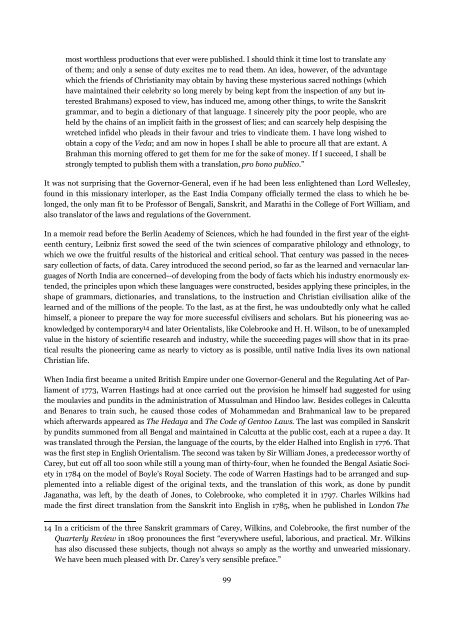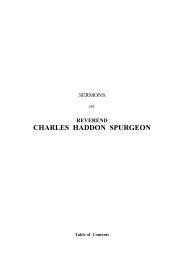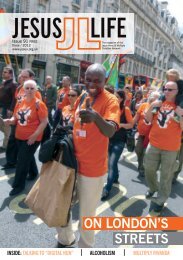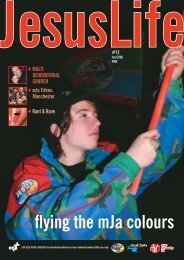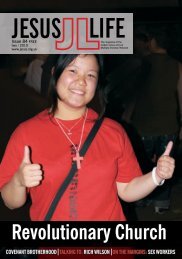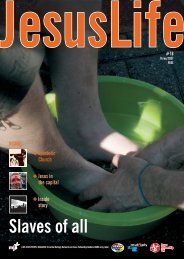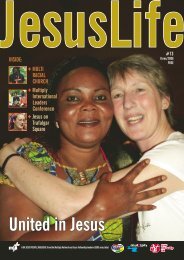Life of William Carey by George Smith - The Jesus Army
Life of William Carey by George Smith - The Jesus Army
Life of William Carey by George Smith - The Jesus Army
Create successful ePaper yourself
Turn your PDF publications into a flip-book with our unique Google optimized e-Paper software.
most worthless productions that ever were published. I should think it time lost to translate any<br />
<strong>of</strong> them; and only a sense <strong>of</strong> duty excites me to read them. An idea, however, <strong>of</strong> the advantage<br />
which the friends <strong>of</strong> Christianity may obtain <strong>by</strong> having these mysterious sacred nothings (which<br />
have maintained their celebrity so long merely <strong>by</strong> being kept from the inspection <strong>of</strong> any but interested<br />
Brahmans) exposed to view, has induced me, among other things, to write the Sanskrit<br />
grammar, and to begin a dictionary <strong>of</strong> that language. I sincerely pity the poor people, who are<br />
held <strong>by</strong> the chains <strong>of</strong> an implicit faith in the grossest <strong>of</strong> lies; and can scarcely help despising the<br />
wretched infidel who pleads in their favour and tries to vindicate them. I have long wished to<br />
obtain a copy <strong>of</strong> the Veda; and am now in hopes I shall be able to procure all that are extant. A<br />
Brahman this morning <strong>of</strong>fered to get them for me for the sake <strong>of</strong> money. If I succeed, I shall be<br />
strongly tempted to publish them with a translation, pro bono publico.”<br />
It was not surprising that the Governor-General, even if he had been less enlightened than Lord Wellesley,<br />
found in this missionary interloper, as the East India Company <strong>of</strong>ficially termed the class to which he belonged,<br />
the only man fit to be Pr<strong>of</strong>essor <strong>of</strong> Bengali, Sanskrit, and Marathi in the College <strong>of</strong> Fort <strong>William</strong>, and<br />
also translator <strong>of</strong> the laws and regulations <strong>of</strong> the Government.<br />
In a memoir read before the Berlin Academy <strong>of</strong> Sciences, which he had founded in the first year <strong>of</strong> the eighteenth<br />
century, Leibniz first sowed the seed <strong>of</strong> the twin sciences <strong>of</strong> comparative philology and ethnology, to<br />
which we owe the fruitful results <strong>of</strong> the historical and critical school. That century was passed in the necessary<br />
collection <strong>of</strong> facts, <strong>of</strong> data. <strong>Carey</strong> introduced the second period, so far as the learned and vernacular languages<br />
<strong>of</strong> North India are concerned--<strong>of</strong> developing from the body <strong>of</strong> facts which his industry enormously extended,<br />
the principles upon which these languages were constructed, besides applying these principles, in the<br />
shape <strong>of</strong> grammars, dictionaries, and translations, to the instruction and Christian civilisation alike <strong>of</strong> the<br />
learned and <strong>of</strong> the millions <strong>of</strong> the people. To the last, as at the first, he was undoubtedly only what he called<br />
himself, a pioneer to prepare the way for more successful civilisers and scholars. But his pioneering was acknowledged<br />
<strong>by</strong> contemporary 14 and later Orientalists, like Colebrooke and H. H. Wilson, to be <strong>of</strong> unexampled<br />
value in the history <strong>of</strong> scientific research and industry, while the succeeding pages will show that in its practical<br />
results the pioneering came as nearly to victory as is possible, until native India lives its own national<br />
Christian life.<br />
When India first became a united British Empire under one Governor-General and the Regulating Act <strong>of</strong> Parliament<br />
<strong>of</strong> 1773, Warren Hastings had at once carried out the provision he himself had suggested for using<br />
the moulavies and pundits in the administration <strong>of</strong> Mussulman and Hindoo law. Besides colleges in Calcutta<br />
and Benares to train such, he caused those codes <strong>of</strong> Mohammedan and Brahmanical law to be prepared<br />
which afterwards appeared as <strong>The</strong> Hedaya and <strong>The</strong> Code <strong>of</strong> Gentoo Laws. <strong>The</strong> last was compiled in Sanskrit<br />
<strong>by</strong> pundits summoned from all Bengal and maintained in Calcutta at the public cost, each at a rupee a day. It<br />
was translated through the Persian, the language <strong>of</strong> the courts, <strong>by</strong> the elder Halhed into English in 1776. That<br />
was the first step in English Orientalism. <strong>The</strong> second was taken <strong>by</strong> Sir <strong>William</strong> Jones, a predecessor worthy <strong>of</strong><br />
<strong>Carey</strong>, but cut <strong>of</strong>f all too soon while still a young man <strong>of</strong> thirty-four, when he founded the Bengal Asiatic Society<br />
in 1784 on the model <strong>of</strong> Boyle’s Royal Society. <strong>The</strong> code <strong>of</strong> Warren Hastings had to be arranged and supplemented<br />
into a reliable digest <strong>of</strong> the original texts, and the translation <strong>of</strong> this work, as done <strong>by</strong> pundit<br />
Jaganatha, was left, <strong>by</strong> the death <strong>of</strong> Jones, to Colebrooke, who completed it in 1797. Charles Wilkins had<br />
made the first direct translation from the Sanskrit into English in 1785, when he published in London <strong>The</strong><br />
14 In a criticism <strong>of</strong> the three Sanskrit grammars <strong>of</strong> <strong>Carey</strong>, Wilkins, and Colebrooke, the first number <strong>of</strong> the<br />
Quarterly Review in 1809 pronounces the first “everywhere useful, laborious, and practical. Mr. Wilkins<br />
has also discussed these subjects, though not always so amply as the worthy and unwearied missionary.<br />
We have been much pleased with Dr. <strong>Carey</strong>’s very sensible preface.”<br />
99


